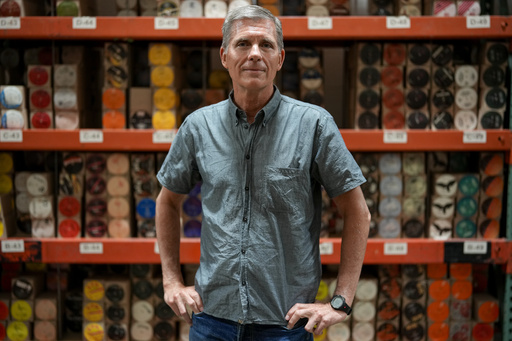
NASHVILLE, Tenn. — For six decades, United Record Pressing, the oldest vinyl manufacturer in the United States, has weathered the storms of changing music formats, from 8-tracks to streaming services. This Nashville-based pressing plant not only survived but has thrived, enhancing its equipment and processes to meet a burgeoning demand for vinyl records, a nostalgic format that has made a robust comeback in recent years.
The 75-year-old establishment has shifted its focus from producing jukebox records to supplying DJs and filling retail shelves, despite the challenges posed by the pandemic. Its warehouse is now stocked with master recordings featuring iconic artists such as Johnny Cash, Kanye West, and The Black Crowes.
When Mark Michaels acquired United Record Pressing in 2007, the vinyl industry was languishing. His team of 38 employees primarily produced promotional singles for rap music. Michaels, motivated by the desire to expand a business with a deep-rooted legacy—the first record pressing plant in the South—did not expect significant growth but aimed to maintain stability. The building itself is steeped in history, having hosted Black artists and music executives during segregation.
“You come into this space and it’s impossible not to feel the weight of 50, 60 years of musical heritage and the significance of its legacy,” Michaels, who serves as CEO and chair, remarked, emphasizing the emotional connection to the facility.
Today, United Record Pressing operates a much larger factory—six times the size of the one Michaels acquired—boasting around 125 staff members who manufacture as many as 80,000 records daily.
Several factors have fueled the vinyl resurgence, including a demand from independent musicians eager to release vinyl albums and renewed interest from major retail chains. In 2023, the revenue generated from vinyl records in the U.S. climbed 10% to reach $1.4 billion, marking the 17th consecutive year of revenue increase, according to data from the Recording Industry Association of America. Vinyl now represents 71% of revenue from non-digital music formats, and for only the second time since 1987, the sales of vinyl have exceeded those of CDs.
The transformation of United Record Pressing began in 1949 with its establishment by Nashville’s Bullet Records. It transitioned to Southern Plastics Inc. in the 1950s and focused primarily on producing 7-inch singles for jukeboxes. By the early 1960s, production soared as the company was cranking out over a million records monthly, partnering with Motown Records and producing the Beatles’ first single in the U.S., “Please Please Me.” A switch to United Record Pressing occurred in the 1970s as records became less common.
Throughout the 1980s, vinyl became a niche market, valued primarily by DJs and hip-hop artists for scratching techniques, while CDs gained dominance. However, interest from indie musicians in the late 2000s sparked a revival. By 2015, vinyl had made a resurgence, yet few manufacturers remained, with many relying on antiquated presses and a diminishing pool of specialists capable of operating them, as noted by Michaels. The COVID-19 pandemic further amplified the vinyl demand.
“It represents art,” Michaels articulated regarding vinyl records. “Both artists and fans desire a tangible item that they can physically hold and connect with. Streaming makes discovering new music easy, but ultimately, it often feels like mere background noise.”
The factory today employs a combination of modern and vintage technology. Retro-acoustic equipment is used to test master versions prior to pressing, while upgraded machinery operates with efficiency and reduced noise levels. Additionally, large bags filled with recycled vinyl materials are available for repurposing into new records. The machines creating master copies have been updated from their previous configurations to accommodate vinyl production.
In a quieter section of the factory, the noise of machinery gives way to music. Here, Tyler Bryant, who leads quality control, listens to numerous records throughout his shift, discovering a variety of artists ranging from Harry Styles to Beyoncé’s “Cowboy Carter.”
“There’s a wealth of diversity, and that’s what I enjoy,” Bryant noted, expressing his eclectic taste in music.
Nearby, plans are underway to renovate the original 1962 plant, ensuring its preservation while paving the way for future developments. Michaels remains optimistic about what lies ahead, stating that his vision for the space is still taking shape. “It’s one of the most significant areas in all of music,” he stated, highlighting the need for this legacy to be honored and made engaging for the community.
